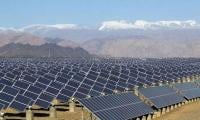KABIRWALA, Khanewal: Posing confidence on cheap off-grid renewable technologies for meeting industrial power needs, one of the country's top companies has embarked upon an energy transition endeavour, involving a host of green solutions.
Besides initiating work on setting up nearly 5.5mwp photovoltaic, ground-mounted solar plants in its several nationwide industrial units, Nestle Pakistan, has also been in the process of installing biomass plant and solar thermal unit as an integrated approach to meet diverse energy needs of the company.
Being one of earliest entrants of ‘one-billion-dollar club’ based on market capitalization in the country and market leader in food business globally, multinational company’s greater reliance on inhouse power generation facilities is seen as a testimony of the fact that national grid is not a sustainable source of energy for the industrial and commercial sectors.
Before installing 2.5mwp solar plant at Kabirwala plant near Multan, Nestlé Pakistan experimented with use of renewable energy by pioneering a 300kv in its Pakistan operation, setting up solar plant in the heart of country at Sheikhupura factory, which is now being scaled up to further 2.6 mwp. Solar panels at Sheikhupura facility near Lahore have been installed while some equipment is waiting to be imported.
Embarking on its net-zero journey, renewable energy helps companies to be sustainable and also makes savings by producing cheap energy. Kabirwala Solar plant is capable of producing 3.6 million kwh annually, covering close to 100 percent of daylight requirement of the facility, causing 0.3 million dollar saving on import of fuel. Biomass plant being set up at the Kabirwala facility would use plant waste, including stubble that farmers generally burn after harvesting of crops. The biomass boiler will generate steam at a rate of 20 tons per hour and shall reduce 10,000 tons of CO2e.
At Sheikhupura plant, solar thermal technology would help avoid use of furnace oil for steam boilers. The company is trying to phase out diesel and furnace oil as much as possible after gradually substituting it with more environmentally friendly gas and integrating with solar power.
The cornerstone of energy strategy at Nestlé Pakistan is to enhance efficiency with a view to reducing consumption of various polluting and costly fuels.
Nestlé is also helping dairy farmers in installing solar panels, besides introducing green energy generation at milk collection units in its value chain. As part of community engagement and energizing its value chain, a series of initiatives involving over 125 solar energy units and biogas plants using animal waste on up to 70 percent cost sharing basis, have been established.
Swiss Ambassador to Pakistan Georg Steiner inaugurated Nestlé Pakistan’s 2.5MW solar power plant near Multan spread over 4.8 acres and completed with an investment of PKR 480 million in the company's two billion rupees push to adopt green energy for running its industrial operations.
These investments include two biomass boilers and additional solar power plants at its other manufacturing sites in Pakistan. It is part of its efforts to reduce greenhouse gas emissions, with a special focus on renewable energy in line with its 2050 Net Zero commitments, as well as Pakistan government’s UN climate change pledge.
Speaking on the occasion, Swiss Ambassador Georg Steiner said, Nestlé Pakistan’s continuous investment and presence in Pakistan for 35 years, shows its confidence in the country, and this solar power plant is a testament to its commitment to create shared value for the people of Pakistan for a cleaner environment. This solar power plant is exactly what can help the Pakistan government achieve its Nationally Determined Contribution (NDC) commitment to have 60% Renewable Energy by 2030.
Jason Avanceña, Chief Executive Officer, Nestlé Pakistan, said as we celebrate 35 years of operations in Pakistan, we are committed to be a force for good throughout our value chain for the future of the country by boosting investment in renewable energy and sustainability initiatives. “We are continuing to accelerate the use of renewable energy,” Avanceña added.
Having completed 35 years of operations, Nestlé Pakistan CEO said his company is also committed to the economic growth of the country by enhancing exports to USD 18 million to 20 countries for earning foreign revenues. Company also further strengthened its localization journey, moving to over 90 percent of raw and packaging requirements locally in 2023 while strengthening local industry.
Talking about the green energy initiatives, that include the 2.5MW Solar plant at KBF, and the planned 2.6MW at Sheikhupura and 266KW in Islamabad, Waqar Ahmad, Head of Corporate Affairs & Sustainability at Nestlé Pakistan, termed adoption of renewable power for meeting energy needs by industry at this scale a watershed moment in energy transition in the country. Such a planned step would help in getting rid of costly and polluting sources of energy, he added.
He was of the view that the path-breaking intervention would be a trendsetter, paving the way for adoption of renewable energy by the industry and commercial ventures. He observed that economic sense is the prime motive of using in-house solar power generation as it has become an increasingly competitive solution for addressing energy related challenges in this part of the world.
The Securities and Exchange Commission of Pakistan logo. — APP/File ISLAMABAD: The three-day capacity building...
The image shows the logo of the Securities and Exchange Commission of Pakistan . — APP/FileISLAMABAD: The Securities...
The picture shows a logo of Federation of Pakistan Chambers of Commerce & Industry . — APP/FileKARACHI: The...
This image released on July 14, 2023, shows the logo of InDrive. — Facebook/inDriveKARACHI: inDrive, a ride-hailing...
Gold bars can be seen in this image. — AFP/FileKARACHI: Gold prices increased by Rs2,500 per tola on Friday in the...
This photo illustration shows Japanese 10,000 yen banknotes in Tokyo on November 19, 2021. — AFPTokyo: The yen...







